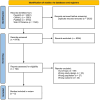Exploring health locus of control among vaccine-hesitant parents: a scoping review
- PMID: 40374211
- PMCID: PMC12083398
- DOI: 10.1136/bmjopen-2025-100202
Exploring health locus of control among vaccine-hesitant parents: a scoping review
Abstract
Objectives: This scoping review aimed to explore the relationship between health locus of control (HLOC) and vaccine hesitancy among parents of children aged 0-18 years, focusing on the tools and methods used to assess these constructs.
Design: The review followed Preferred Reporting Items for Systematic Reviews and Meta-Analyses extension for Scoping Reviews guidelines and adhered to established methodologies for scoping reviews, including systematic searches across four electronic databases.
Data sources: PubMed, PsycINFO, Web of Science and CINAHL were searched using a comprehensive search strategy to identify relevant studies on 24 September 2024.
Eligibility criteria for selecting studies: Studies were included if they examined HLOC and vaccine hesitancy in parents, measured these constructs with validated tools and focused on childhood vaccination.
Data extraction and synthesis: Data were extracted into a structured table capturing study characteristics, HLOC and vaccine hesitancy measurements, and key findings. Results were synthesised narratively to highlight associations and patterns.
Results: Five studies involving a total of 11 758 parents and caregivers of children aged 0-18 years met inclusion criteria. Higher internal HLOC was consistently associated with lower vaccine hesitancy and higher compliance, while lower chance HLOC correlated with greater hesitancy. Powerful others HLOC (ie, trust in healthcare professionals) emerged as a key predictor of better vaccine adherence.
Conclusions: The findings suggest that internal HLOC and trust in healthcare providers are predictors of vaccine acceptance among parents. However, standardised tools and longitudinal studies are needed to further elucidate these relationships and inform targeted interventions to reduce vaccine hesitancy.
Keywords: PUBLIC HEALTH; Parents; Vaccination.
© Author(s) (or their employer(s)) 2025. Re-use permitted under CC BY-NC. No commercial re-use. See rights and permissions. Published by BMJ Group.
Conflict of interest statement
Competing interests: None declared.
Figures
Similar articles
-
A path analysis model suggesting the association between health locus of control and compliance with childhood vaccinations.Hum Vaccin Immunother. 2018 Jul 3;14(7):1618-1625. doi: 10.1080/21645515.2018.1471305. Epub 2018 Jun 18. Hum Vaccin Immunother. 2018. PMID: 29771633 Free PMC article.
-
Parents' and caregivers' role toward childhood vaccination in Albania: assessment of predictors of vaccine hesitancy.Ann Ig. 2023 Jan-Feb;35(1):75-83. doi: 10.7416/ai.2022.2521. Epub 2022 May 6. Ann Ig. 2023. PMID: 35532052
-
Parental experiences of caring for their preschool children after declining vaccines: a qualitative systematic review.JBI Evid Synth. 2025 Feb 1;23(2):244-332. doi: 10.11124/JBIES-23-00405. Epub 2025 Jan 14. JBI Evid Synth. 2025. PMID: 39807617
-
Parents' and informal caregivers' experiences of accessing childhood vaccination services within the United Kingdom: a systematic scoping review of empirical evidence.BMC Public Health. 2024 Dec 18;24(1):3434. doi: 10.1186/s12889-024-20981-0. BMC Public Health. 2024. PMID: 39696198 Free PMC article.
-
Folic acid supplementation and malaria susceptibility and severity among people taking antifolate antimalarial drugs in endemic areas.Cochrane Database Syst Rev. 2022 Feb 1;2(2022):CD014217. doi: 10.1002/14651858.CD014217. Cochrane Database Syst Rev. 2022. PMID: 36321557 Free PMC article.
References
-
- Santé O, World Health Organization Understanding the behavioural and social drivers of vaccine uptake WHO position paper–May 2022–Comprendre les facteurs comportementaux et sociaux de l’adoption des vaccins Note de synthèse de l’OMS–mai 2022. Wkly Epidemiol Rec. 2022:209–24.
Publication types
MeSH terms
LinkOut - more resources
Full Text Sources
Medical
Miscellaneous

